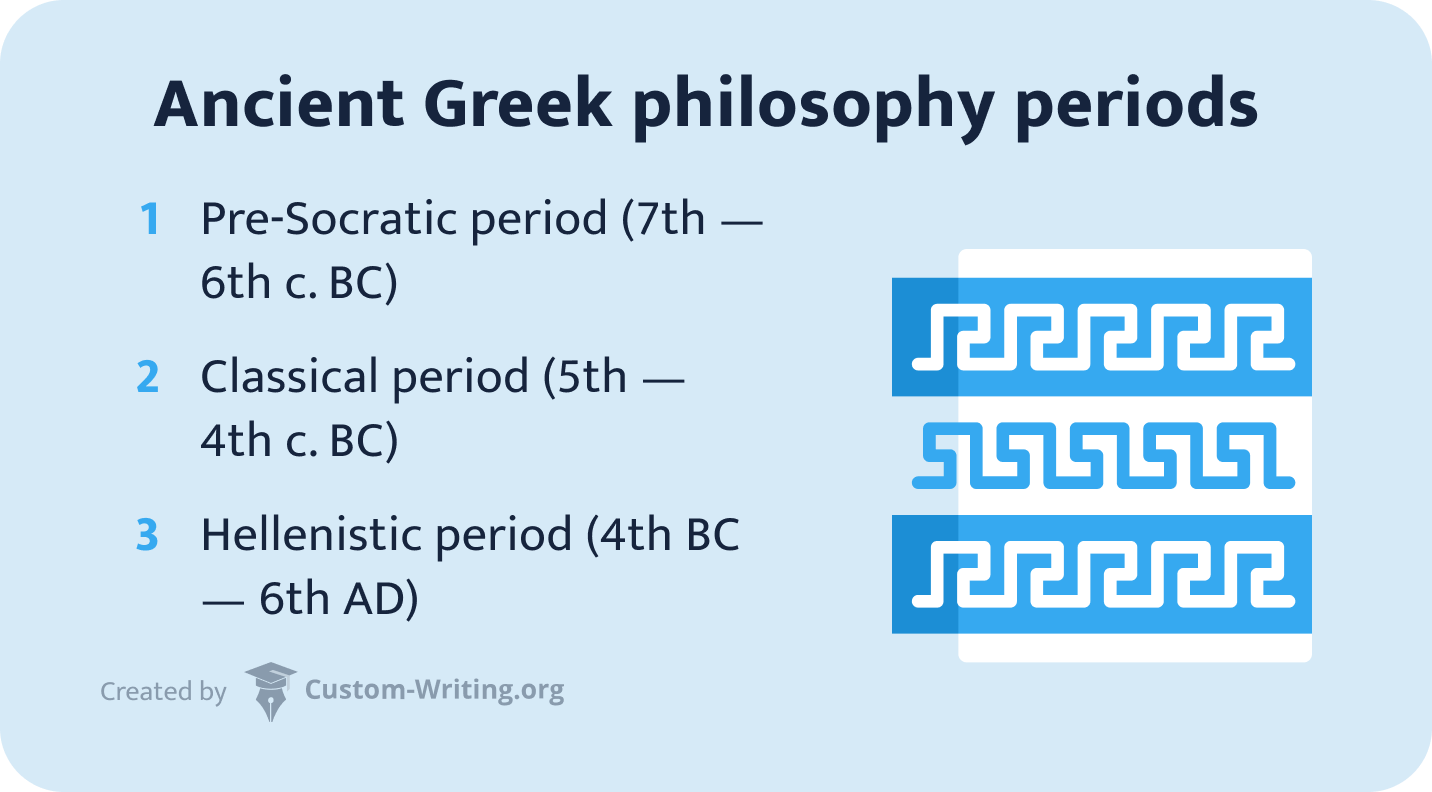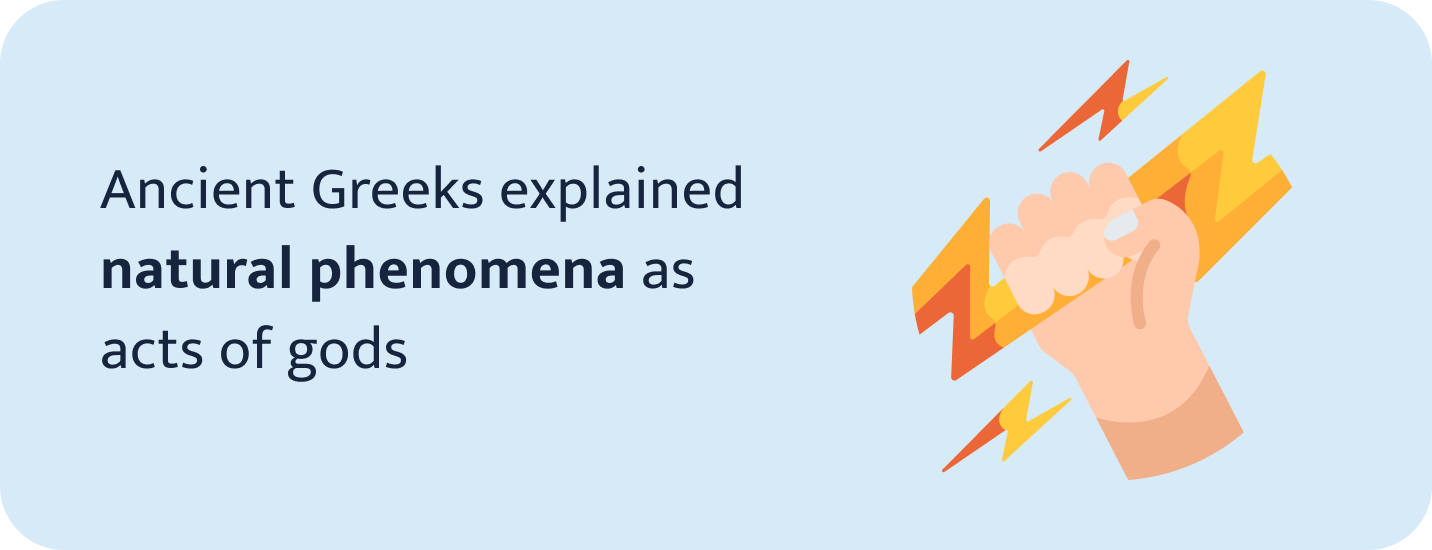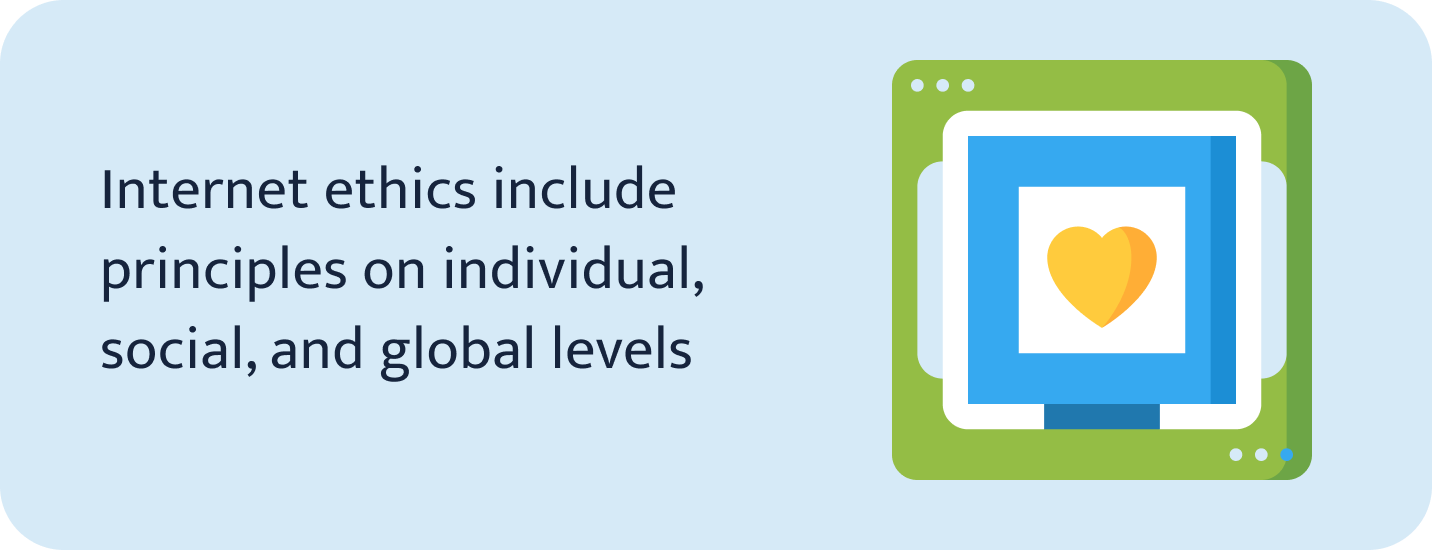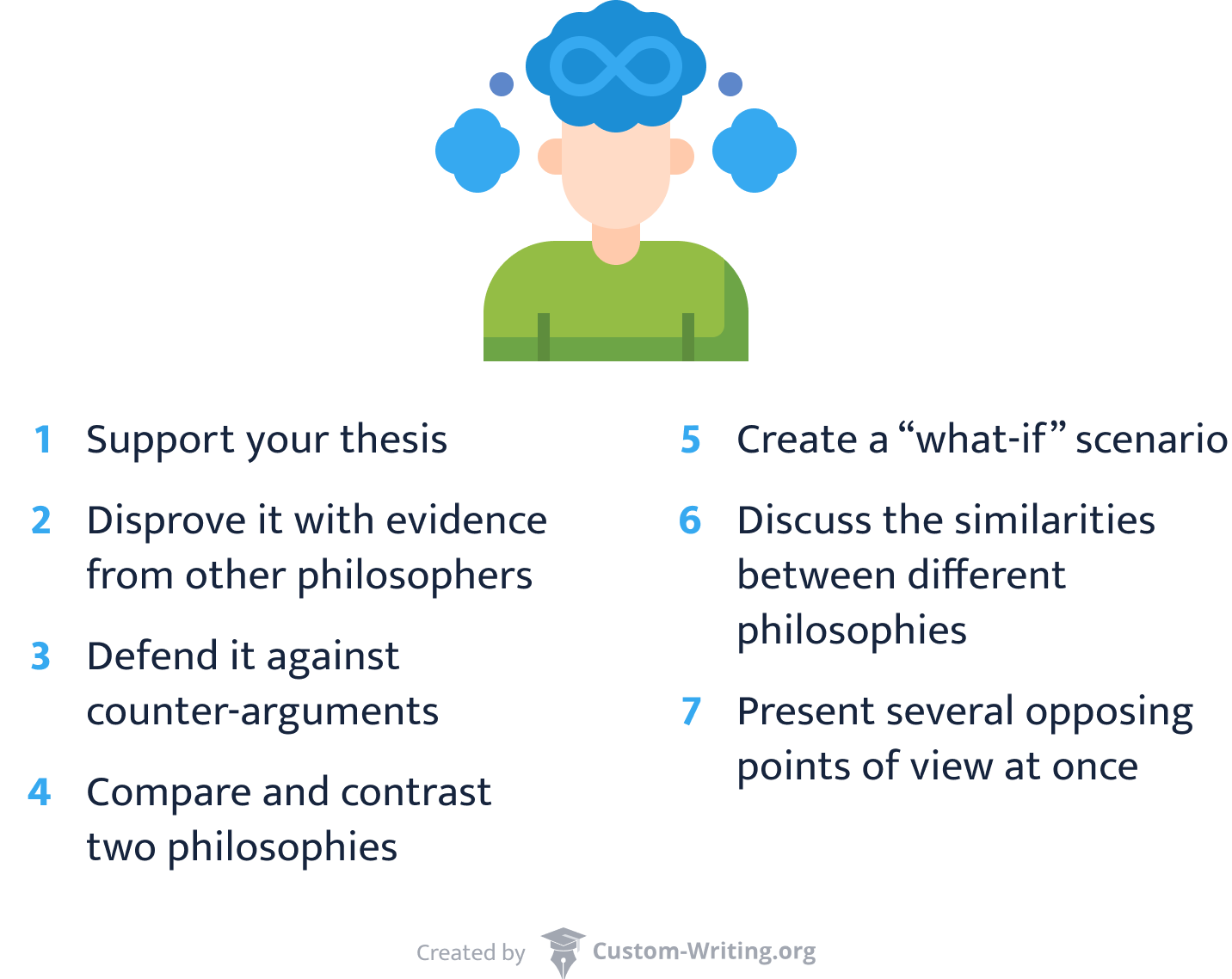If you’re brainstorming philosophical debate topics or searching for profound philosophy essay questions, the possibilities are as vast as human thought itself. Your paper can be a discussion on free will and determinism or a case study of contemporary issues like the ethics of artificial intelligence. Any philosophical topic can inspire critical thinking and spirited debates for your paper or presentation.
In this guide, discover a collection of thought-provoking philosophy essay topics designed to encourage in-depth analysis:
- Essay ideas from Ancient Greek philosophy to 20th-century concepts
- Philosophy argumentative essay topics
- Philosophy topics for presentation
And this is only a minor part of our compilation! This guide by our Custom-Writing.org experts will provide you with inspiration and guidance for tackling all the big questions of humanity.
- 🔝 Top 10 Topics
- 💭 What Is Philosophy?
- 🔥 Top 10 Topics in Philosophy for 2026
- ⭐ Top 10 Philosophy Essay Topics
- ✍️ Philosophy Topics
- 🧐 Top 50 Philosophical Questions
- 📖 Philosophy Research Topics
- ⚖️ Philosophy Argumentative Essay Topics
- 🗣️ Philosophy Topics for Presentation
- 🖊️ Other Philosophy Topics to Write About
- 💬 Philosophy Topics to Discuss
- 🏛️ Philosophy Schools
- 💡 Philosophy Essay Tips
🔝 Top 10 Philosophy Essay Topics
- What is metaphilosophy?
- Compare 2 schools of thought
- Ancient vs. modern philosophy
- Philosophical concepts of space
- Applied aesthetics in fashion design
- The concepts of the philosophy of self
- Ancient traditions of political philosophy
- How philosophical traditions vary by region
- Modern problems of the philosophy of religion
- Contemporary issues of environmental philosophy
Philosophy topics can be assigned to high-school and college students as part of their philosophy, humanities, and general education courses. Some of the above-mentioned ideas, such as metaphilosophy or ancient vs. modern philosophy, are good for beginners, while other topics, such as the philosophical perceptions of space, are more advanced. Whether you’re struggling with complex concepts or just need to focus on higher-priority tasks, you might want to find someone to write your philosophy paper. If that sounds like you, consider using our custom writing service! We will help you craft an original, meaningful philosophy essay according to your requirements within your indicated deadline.
💭 What Is Philosophy?
As you can see, philosophy studies a lot of things, and can be divided into the following branches:
- Metaphysics studies reality: what it is, what its properties are, where does it come from, and so on. It is also concerned with the problems of personal identity, free will, and religion.
- Epistemology, which is the study of knowledge and thinking. For example, it asks such philosophical questions as “what is knowledge?” “can knowledge ever be sufficient?” “how can a certain belief be justified?” “how does perception work?” and so on.
- Logic, which studies arguments and reasoning. It includes such types of thinking as induction, abduction, and deduction.
- Ethics, which is concerned with the concepts of right and wrong behavior. It studies ethical principles, their origin, and ways by which they can be improved. Ethics also covers controversial subjects, such as abortion, animal rights, and capital punishment.
- Aesthetics, which is the study of beauty. It includes the study of artworks, perception of beauty, aesthetic experience, and other related concepts.

All these different types of philosophies are equally valid and exciting! Choose any of them and have a philosophical discussion about life, justice, happiness, time, or beauty.
Who Is the Father of Philosophy?
The Greek philosopher Socrates is often called the father of western philosophy. He taught his disciples the importance of asking questions, showing that philosophy is the art of searching for the truth.
🔥 Top 10 Philosophical Debate Topics 2026
- Philosophical perspectives on the act of forgiving.
- The moral dilemmas of using AI.
- Feminist philosophy and its features.
- The purpose of life: ethical considerations.
- Philosophical aspects of gender and sexuality.
- The role of cultural diversity in achieving global justice.
- Philosophy of mind and its importance.
- Minimalism as a philosophical lifestyle.
- How the climate crisis shapes the relationship between humans and nature.
- Philosophical critiques of moral relativism.
⭐ Top 10 Philosophy Essay Questions
- What is action theory?
- Definition of anarchism
- Philosophy of business ethics
- What is the soul made of?
- Why you should study logic
- Are beauty standards objective?
- Is religion relevant in the modern world?
- Can happiness be scientifically measured?
- Does higher intelligence make you less happy?
- Does personality consist of memories?
✍️ Philosophy Topics
Here you will find a list of philosophy topics for essays, discussions, or presentations. It can be used by high school as well as university students.
🏺 Ancient Greek Philosophy Topics
Ancient Greece can be regarded as a cradle of Western philosophy. Plato, Aristotle, Socrates, and many others were the first who started questioning the world around us. Initially, Ancient Greek philosophy was interested in the essence of the universe, but then it also became oriented at the problems of consciousness, politics, and existence.

- Materialism and naturalism of the pre-Socratic period. Pre-Socratic philosophers believed that only matter was real, rejecting the ideas of spirituality. You can compare and contrast it with Platonic idealism.
- Democritus and pre-Socratic atomism. The concept that all matter is made of small particles dates back to ancient times. You can compare the idea of atomism with what we know today.
- Pre-Socratic view on knowledge and perception. This topic refers to the idea that we get all information by perceiving images of everything that surrounds us.
- Diogenes and the Sophists. Sophists believed that the universe is ruled by intelligence. They also popularized ethics and politics as philosophical aspects.
- What are the key elements of Socrates’ philosophy? Socrates was an enigmatic figure with a unique philosophical outlook. His ideas influenced everything from politics to pop culture.
- Heraclitus of Ephesus and his school. Philosophers of the Ephesian school believed that everything in the world is connected by a logical structure called Logos. This idea parallels several other concepts, such as the Tao.
- Plato’s Republic: what is democracy? In the Republic, Plato describes his views on an ideal society. It includes the concepts of what later became communism and totalitarianism.
- The Eleatic school’s doctrines. It’s a fascinating philosophy paper topic that includes the concept of one omnipotent God as opposed to many gods, as well as new standards of logical reasoning.
- Philosophy of Empedocles. Empedocles was a pre-Socratic philosopher who introduced the idea of cosmogony and fundamental forces. You can write an excellent essay about how Empedocles’ views are reflected in science.
- Plato’s ethics. Here you can discuss Plato’s ideas about virtues, happiness, harmony, and other concepts.
- Plato and idealism. Plato’s central doctrine included the notion of perfect “ideas,” which manifest itself in our material world as all objects. You can write an excellent paper on this subject!
- Plato: allegory of the cave. In this essay, you may talk about Plato’s concept of reality, definitions of microcosm and microcosm, and the “unifying idea.”
- Aristotle: logic and dialectic. Aristotle was the first philosopher who formulated the rules of logical reasoning. They were crucial in the development of exact sciences.
- Aristotle’s Metaphysics and its legacy. You can write an essay about Aristotle’s major work and how it influenced philosophers such as Thomas Aquinas.

- Hellenistic philosophy and Stoicism. The ideas of Stoics originated in Greece but were especially popular in Rome. One of the most prominent stoics, Marcus Aurelius, was also a Roman emperor.
- Stoicism and Buddhism: a comparison. This exciting philosophy essay topic allows you to compare the common concepts in these very similar philosophies: from self-discipline to eternal recurrence.
- What are the key characteristics of Skepticism? Ancient skepticism was rooted in the desire to find truth by continually questioning it. See what other ideas made the Skeptics so influential.
- The concepts of the soul in Ancient Greece. Start with Aristotle’s view on the soul-body relationship and proceed to Plato’s position and the Stoic theory of the soul.
- Psychology in Aristotle’s De Anima. Aristotle’s writings often include ideas concerning psychology. In De Anima, he attempts to describe the human mind in connection to psychology, as well as biology.
- What were Plato’s ideas about aesthetics? This stunning philosophy paper topic covers Plato’s concept of beauty, art, and inspiration in his dialogues Hippias Major, Republic, and Phaedrus.
- How did other philosophers influence Plato’s ideas?
- The Lyceum: Aristotle’s school and its impact.
- Mathematics and philosophy of Pythagoreanism.
- What were the concepts of principal substances in Greek philosophy?
- Heraclitus: universal flux and the unity of opposites.
- Cosmological ideas in Ancient Greece: Plato, Aristotle, Heraclitus, Empedocles.
- Seneca’s views on anger arguments by Aristotle.
- Explanation of natural phenomena: mythology vs. philosophy.

- Xenophanes and monotheism.
- Melissus of Samos: the concept of “what-is.”
- Zeno of Elea: the impact of paradoxes on philosophy and science.
- The philosophy of Democritus: anthropology.
- Diogenes: the founder of cynicism.
- Plato’s and Aristotle’s thoughts on knowledge: a comparison.
- Philosophy of Protagoras: ethics, language, argument.
- Plato’s concept of reality.
- Ancient Greek types of love: eros, agape, and philia.
- Moral Philosophical Views: From Plato to Nussbaum.
- Theophrastus: ideas on psychology, logic, and metaphysics.
- What is “the Socratic method?”
- What is Plato’s theory of recollection?
- What was Plutarch’s idea of God and daemons?
- Anaximander’s philosophy: substantial opposites and the origins of things.
- What was the concept of “logos” in different philosophies?
- Diairesis: the Platonic method.
- Aristotle’s concept of catharsis.
- The ever-changing nature of reality in ancient philosophy.
- The concept of pneuma in works of Aristotle and Stoics.
- What was Homer’s influence on Greek philosophy?
- The study of ontology in Plato, Aristotle, and Avicenna.
- Natural philosophy as the prototype of natural science.
- Moral intention concept in philosophy.
- Apeiron and other concepts in Anaximander’s cosmological theory.
- What were Hesiod’s theogony and cosmogony?
- What is the concept of “becoming” in atomism?
- What are the definitions of monad and dyad in Pythagoreanism?
- Eudemonia in works of Socrates, Plato, Aristotle, and Stoics.

- What is the definition of arete in Plato?
- What are the forms of the good in Plato’s Republic?
- Aristotle’s virtue ethics.
- Aristotle’s idea of hyle vs. Plato’s eidos.
- Hylozoism in pre-Socratic philosophies.
- What is tabula rasa?
- Metempsychosis as the concept of reincarnation.
- Ousia: the feminine principle in Ancient Greek philosophies.
- What are physis and nomos in pre-Socratic philosophies?
- What are Aristotle’s “four causes”?
- The concept of predication in Ancient Greek philosophy.
- What is the Euthyphro dilemma?
- What Plato meant by “philosopher-king”?
- The lost city of Atlantis.
- What was the problem of universals in Ancient Greek philosophy?
- Golden mean as a virtue and an attribute of beauty.
- Pyrrhonism and its philosophy.
- The concepts of episteme and doxa.
- The problem of the criterion in Pyrrhonism.
- Acatalepsy vs. katalepsis in Stoicism.
- What are the main features of Homeric worldview?
- Aporia in rhetorics.
- What is Platonic realism?
- Ionian school and its philosophies.
- Trivium: the three arts of discourse.
- Pathos in Aristotle and other philosophers.
- Aristotle’s views on euthanasia.
- Isocrates: rhetoric and influence.
- What is the place of hedone in Aristotle’s ethics?
- Tetrapharmakos and other Ancient Greek views on happiness.
- Epicureanism vs. Stoicism.
- The philosophy of Epicureanism.
- Logic and ethics in works of Antisthenes.
🏰 Medieval Philosophy Topics
Medieval philosophy was mostly focused on studying nature and religion. The most popular school of thought at that time was Scholasticism. It refers to a particular way of teaching and education. The Classical ideas mostly lost their influence, though some philosophers tried to incorporate the ideas of Ancient Greeks into their doctrines.
- Roger Bacon’s re-interpretation of Aristotle. In this philosophy essay, you can write about Bacon’s views on soul-body dualism, matter, universals, and knowledge

- Robert Grosseteste as the founder of the modern scientific tradition. This philosopher was one of the most remarkable figures in Medieval England. His ideas in theology and natural sciences helped to make Oxford the center of intellectual life.
- Aquinas’ five proofs of God’s existence vs. Aristotle’s four causes: a comparison. Aquinas’ Five Ways are exciting from a logical point of view. You can discuss each of them and find parallels with Aristotle’s causes of being.
- Augustine of Hippo’s idea of illumination vs. Plato’s conception of recollection: a comparison. Similarly, you can compare the theory of illumination with Plato’s “prior knowledge.”
- Aquinas: logic and debate. Aquinas famously came up with a very effective model of debate. It is based on Ancient Greek ideas and is based on including both thesis and antithesis.
- Avicenna: metaphysics. Avicenna’s study of metaphysics was aimed at understanding the connections between all things in the world. It includes his “cause chains” and the concept of intelligence.
- Augustine’s philosophy of language. Write an essay about the connections between Augustine’s thoughts and Stoic theories of grammar. Mention his original ideas, too.
- John Duns Scotus’ natural theology. Here you can discuss Scotus’ elaborate arguments for the existence of God as the first cause of everything.
- Rucelinus as the founder of nominalism. Nominalism is based on the rejection of everything abstract, as well as the absence of universals.
- What makes the Ockham’s razor principle so widely applicable? William of Ockham was a nominalist, too, and preferred simple explanations to miracles. His “razor” method is still considered very effective.
- What did Averroes contribute to philosophy and law?
- Aquinas: knowledge and perception.

- The medieval conception of motion: Aristotle vs. Avicenna.
- Avicenna’s views on natural science and atomism.
- Cosmological argument as a philosophical concept.
- Augustine’s ethics: eudaimonism in the context of Christianity.
- Augustine’s understanding of memory.
- What was St. Anselm’s conception of divine attributes?
- What were the ways of integrating sacred doctrine with secular learning in medieval philosophy?
- In what ways does faith relate to reason in medieval philosophies?
- Medieval theology as philosophy of religion.
- Scholasticism: principal characteristics.
- How did Averroes re-interpret Aristotle’s idea of time?
- The Scholastics attitude towards Aristotle.
- Religious concepts in Eastern philosophy.
- What characterized the problem of universals in medieval philosophy?
- Peter Abelard: dialectics and conceptualism.
- Guillaume de Champeaux: the founder of moderate realism.
- What was Peter Lombard’s concept of marriage?
- What was Albert the Great’s interpretation of Aristotelian metaphysics?
- Christian teaching of St Augustine.
- The discourse of the Apologetics: Islam, Hinduism, Judaism.
- Philosophical apologetics: main categories of arguments.
- What characterized the idea of a human soul in Aquinas and Augustine?
- The doctrines of John Wycliffe.
- Plato’s role in medieval concept of soul-body dualism.
- Theological approaches comparison: Thomas of Aquinas and Saint Augustine.
- What was the philosophy of the Dominican order?
- The problem of free will: theological point of view.
- What are the concepts of sin and divine providence?
- What was Bonaventure’s conception of creation?
- John Duns Scotus’ contribution to Aristotelian study of matter.
- East and West teachings’ concepts differences.
- What characterized Albert of Saxony’s logic and metaphysics?
- Nicholas of Autrecourt’s concepts of experience and perception.
- Insolubilia, or the “liar paradox”, in medieval philosophy.
- Richard Kilvington’s theology: influences and legacy.
- What was the problem of theodicy in medieval philosophy?
- William of Ockham: the notion of mental language.

- The concept and discourse of the divine freedom.
🎨 Renaissance Philosophy Topics
The fundamental concept of the Renaissance philosophy is humanism. It appeared as an alternative to strict religious doctrines of the Medieval period. The main inspiration for the Renaissance philosophy came from Ancient Greek and Roman sources, that’s why it is called Renaissance: a “rebirth” of classical philosophy.
- The concept of “renaissance man”. “Renaissance man” is defined as someone who embraced all available knowledge and used their full potential. See what outstanding Renaissance personalities fit this description!
- Roger Bacon’s contribution to philosophy and sciences. This philosophy paper topic includes Bacon’s ideas about logic, semiotics, optics, and other subjects. Bacon is a prime example of a “renaissance man” who excelled in many areas.
- Why is Petrarch called the “father of humanism”? Discuss Petrarch’s attitude towards ancient authors, and how his writings gave rise to a humanist philosophy that defined Renaissance.
- Tommaso Campanella’s The City of the Sun as a utopia. This book was inspired by Plato’s Republic and Atlantis, and it describes a perfect world united by a theocratic monarchy.
- Plato’s influence in the Renaissance era vs. Aristotelianism in the Middle Age. It’s an interesting philosophical topic that can show you why during the Renaissance humanism became so popular.
- Humanists vs. Calvinists: a comparison. Here you can write about the Calvinist concept of predestination and Humanist idea of freedom.
- François Rabelais as a humanist. Discuss Rabelais’ Gargantua and Pantagruel books and point out humanist ideas in them!
- The Renaissance critique of scholasticism. With the rise of humanism, scholasticism lost its popularity. It was now considered formalistic and too rigid. Find out why!
- In what ways does Calvinism parallel capitalism? The way Calvinist influenced capitalism and the American Dream can be an excellent topic for an essay or a research paper.
- How did Machiavelli bring humanism into politics? Niccolo Machiavelli revolutionized the concept of politics. He promoted the idea of ambition and innovation as opposed to virtue.

- The critique of Pelagianism by Jerome and Augustine.
- Desiderius Erasmus of Rotterdam’s “Christian humanism.”
- Jacques Lefèvre d’Étaples’s role in Protestant reformation.
- Thomas More’s Utopia.
- Giovanni Pico della Mirandola’s “manifesto of the Renaissance”.
- How did Martin Luther’s theology change Europe?
- John Calvin and his philosophy.
- Mona Lisa and Renaissance humanism.
- Who were the heretics?
- Nominalism: impact on doubting faith.
- What philosophical, intellectual, and political conditions led to the Reformation?
- Skepticism during the Renaissance period.
- How did Paul of Venice expand on Averroes’ ideas?
- The question of the immortality of the soul in Renaissance-era philosophy.
- What characterized Nicoletto Vernia’s gnoseology and logic?
- Pietro Pomponazzi’s discussion of the supernatural.
- Jacopo Zabarella’s new method of scientific inquiry.
- What was Heinrich Cornelius Agrippa’s Pyrrhonic skepticism?
- What were Lorenzo Valla’s methods of textual analysis and criticism?
- How did Rudolph Agricola revolutionize rhetorical studies?
- Why is Juan Luis Vives considered “the father of modern psychology?”
- Political influence of William Shakespeare.
- The evolution of psychology during the Renaissance period: spiritual and biological aspects.
- What characterized Platonism and Neoplatonism in the Renaissance era?
- How did Marsilio Ficino merge ideas of both Plato and Aristotle?
- The history of European alchemy.
- John Dee’s philosophy, alchemy, and divination.
- Magic and science in Giovanni Pico della Mirandola and Marsilio Ficino.
- What were Nicholas of Cusa’s political and philosophical contributions?
- What was the influence of Kabbalah in Renaissance-era Italy?
- What were the key differences between medieval and Renaissance notions of probability?
- What characterized Bessarion’s Neoplatonic views on science?
- The concept of Platonic love in Ficino, Bembo, and Leone Ebreo.
- Michel de Montaigne’s skepticism and its legacy.
- René Descartes’ philosophy and influence.

- Francisco Sanches: empirical skepticism.
- Pierre Gassendi and atomism of the Renaissance era.
- Bernardino Telesio’s critique of metaphysics and the importance of empiricism.
- The legacy of Giordano Bruno.
- Franciscus Patricius’ theory of the universe.
📚 Classical German Philosophy Topics
Classical German philosophy is synonymous with Idealism. The most influential philosopher of that period, Immanuel Kant, paved the way for the exploration of human will, consciousness, and ego. Later the ideas of idealists inspired psychoanalysis.
- How did Johann Gottlieb Fichte transform Kant’s critical idealism into absolute idealism? It includes the elimination of the “thing-in-itself” concept and proclaiming the self as the ultimate reality.
- Friedrich Wilhelm Joseph von Schelling’s absolute idealism. According to von Schelling, everything we see are the works of imagination, and nature itself is spiritual. These ideas influenced German Romanticism.
- How did Kant differentiate modes of thinking? In this essay, you can discuss analytic and synthetic propositions, their definitions, and applicability.
- Kant’s ethical ideas. See how they’re connected to his belief in everyone’s fundamental freedom.
- How did Immanuel Kant influence other philosophers? Kant was hugely influential: in particular, he provided the basis for what later became Marxism.
- Leibniz’s concept of knowledge. You can include Leibniz’s idea that it’s possible to understand everything in the world with the help of logic and analysis.
- How did Indian philosophy influence Schopenhauer? For example, you can study the influence of Buddhism in Schopenhauer’s idea that the world is full of suffering, which can be overcome by way of renunciation.
- What did Nietzsche mean by saying that “God is dead”? This quote is often misunderstood. In fact, it is hinting at the fact that traditional values have lost their power.
- What were Immanuel Kant’s antinomies? Antinomies are contradictions that can both be justified. They create logical paradoxes.
- What are the main points of Kant’s transcendentalism? In short, transcendental idealism focuses on the self as the center of reality. People get information about the outer world, but it will never be able to know the world as it is.
- Georg Wilhelm Friedrich Hegel and his philosophy.

- The problem of subjectivity and consciousness in German Idealism.
- What are paralogisms?
- Ends-in-themselves and means-to-ends: definition and comparison.
- What is Hegel’s absolute spirit?
- Schopenhauer’s philosophy of pessimism.
- How did Nietzsche influence the ideas of the National Socialists?
- Kierkegaard’s angst and “fear and trembling.”
- What are Leibniz’s contributions to metaphysics and epistemology?
- Benedict de Spinoza and his doctrines.
- F.W.J. Schelling’s understanding of nature.
- Ethics and moral philosophy in Kant, Nietzsche, and others.
- Schelling’s identity philosophy.
- Ludwig Feuerbach anthropological materialism.
- Kierkegaard’s conception of irony.
- What were Christian Thomasius’ views on reason and prejudice?
- What was Christian Wolff’s role in German philosophical thought?
- What are the main features of Pietism?
- Who were the Thomasians?
- How did Sturm und Drang movement influence philosophy?
- Baumgarten’s Aesthetica and the concept of art.
- What characterized Elisabeth of the Palatinate’s critique of Descartes?
- Johann Wolfgang von Goethe’s impact on German philosophy.
- What did Johann Gottfried Herder mean by “the great chain of being”?
- What was Richard Warner’s influence on Nietzsche’s philosophy?
- What was Johanna Charlotte Unzer’s contribution to feminism?
- Friedrich Hölderlin as an Idealist.
- Epistemology and metaphysics: philosophers views.
- What are Karl Marx’s concepts of labor, class, and capital?
- What were Schleiermacher’s thoughts on psychology and knowledge?
- What was Schleiermacher’s influence on Gadamer and Heidegger?
- What were Nietzsche’s main “positive values?”
- What was Nietzsche’s interpretation of nihilism?
- Nietzsche’s doctrine of “will to power.”
- What impact had Eastern philosophy on Nietzsche’s work?
- Nietzsche’s concept of Apollonian vs. Dionysian and its impact on culture.
- What was the role of Plato and Aristotle in classical German philosophy?
- Leibniz’s vs. Pythagorean theory of monads: a comparison.
- What is Leibniz’s “fundamental question of metaphysics”?
- Gottfried Leibniz’s contribution to logic.

🛰️ 20th Century Philosophy Topics
In the 20th century, philosophy was developing just as rapidly as technology. New standards of living, change of values, wars, and conflicts led to increased disappointment and alienation among people. Philosophers of that era tried to reflect on these changes and come up with new outlooks on life and the world around us.
- Karl Popper’s concept of three worlds. This philosophy topic includes the analysis of three categories of reality (physical objects, mental works, and objective knowledge) and their interactions.
- How did the theory of relativity and quantum mechanics influence idealism in the 20th century? It’s a terrific philosophy question that shows the complexity of our reality.
- The philosophy of modernism as a reflection of societal changes. It includes the massive influence of art on modernism. See what led to the rejection of realism and increased focus on personal experience.
- Lyotard’s Postmodern Condition: technology, communication, and mass media. Lyotard’s book offers a surprisingly accurate glimpse into the 21st century’s spread of communication technologies. It can be an exciting paper topic.
- Marxism-Leninism: key concepts and legacy. In this essay, you can discuss world revolutions, vanguardism, and other concepts that led to the popularity and eventual demise of Marxist-Leninist philosophy.
- Marxism vs. Freudism differences. Freudism was based on psychoanalysis; later, Freud’s ideas about the human psyche were expanded into a philosophy concerned with society as a whole.
- Slavoj Zizek’s concept of The Real. Inspired by Lacan’s psychoanalysis, Zizek formulated a classification of different types of The Real. He provided examples from pop culture, such as The Matrix.
- Feminist philosophers: Rosa Luxemburg, Sandra Bartky, Julia Kristeva. While the philosophy of the 20th century was dominated by men, there were also many outstanding women. You can choose to write about them!
- Foucault’s theories of power, knowledge, and subjectivity. Foucault’s philosophy was very influential in society, as well as in the arts. In many ways, he shaped postmodernism as we know it.
- Deconstruction as a critique of Platonism. Deconstructivism concerned everything from architecture to queer studies. It was influenced by Nietzsche and critiqued Plato’s idea of forms.
- Walter Benjamin‘s “angel of history.” This is a wonderful topic that covers Benjamin’s concept of history and the importance of remembering the past exactly as it was.

- Jacque Derrida’s key concepts: an overview. Here you can discuss the ideas Derrida introduced to philosophy as well as literature studies and politics.
- Karl Marx views on history. Karl Marx’s historical materialism was tremendously influential in early socialist societies. Explore it in your essay!
- Theodore Herzl and Zionism. This philosophy topic is closely connected with 20th-century history. You can also discuss arguments for and against Zionism.
- Jacques Lacan’s impact on philosophy, linguistics, and film theory. Discuss Lacan’s concepts such as the “mirror stage” and” the Other” in your philosophy essay!
- International development, colonialism, social inequality and class stratification. This topic is centered on the influence of the colonial past on today’s politics. You’d be surprised to see how much colonial worldview affected almost every facet of life in all countries.
- Behaviorism and philosophy of mind. It’s a very interesting branch of philosophy that has elements of natural science, linguistics, and psychology. See what different approaches to behavior were proposed by philosophers, and describe them in an argumentative essay!
- Being-in-itself in Heidegger and Sartre. This topic is closely connected with several other concepts, such as Dasein and bad faith, and it can be an excellent theme for an extended research paper.
- John Searle’s “Chinese room.” It is an exciting topic about the philosophical aspects of artificial intelligence. “Chinese room” is a thought experiment that led to many curious replies.
- Existentialism in Jean-Paul Sartre’s Nausea: an analysis. Here you can study one of the most brilliant books of the 20th century from the philosophical point of view! Discuss what made Sartre’s Nausea so famous and influential.
- Anarchism in the 20th century: the classical era.
- Communism: theory and reality.
- The fundamental concepts of existentialism: angst, despair, the absurd.

- Existentialism in France after WWII: key figures.
- Karl Popper’s critique of historicism.
- Determinism: mathematical models and the quantum realm.
- Post-modernism vs. modernism: a comparison.
- Foucault’s conceptions of biopower and biopolitics.
- Structuralism concept in philosophy.
- What was Karl Marx’s idea of a higher-stage communist society?
- Friedrich Engels’ socialism vs. the Soviet economic model.
- How Aristotle and other Greeks influenced Heidegger?
- Heidegger’s concepts of “present-at-hand” and “ready-to-hand.”
- Bertrand Russell and analytical philosophy.
- What was Frankfurt school’s dialectical method of investigation?
- Freudian perspective on dreams.
- Jaques Maritain and neo-Thomism.
- What were the breakthroughs of 20th-century feminism?
- What was the influence of war and globalization on the late 20th-century anarchism?
- Queer theory and philosophy of gender.
- The concept of the Other in philosophy, psychology, and film.
- The power of ideas: from ancient to modern philosophies.
- Hans-Georg Gadamer’s philosophical hermeneutics.
- What are the key ideas of Jean-Paul Sartre’s philosophy?
- Simone de Beauvoir’s existentialist philosophy.
- What is the concept of Dasein in Heidegger’s Being and Time?
- The Decline of the West: what caused Oswald Spengler’s bleak outlook on the future?
- Philosophical views of Albert Camus: absurdism, existentialism, anarcho-syndicalism.
- Absurdism: parallels with nihilism and existentialism.
- Nihilism in the 20th century: Deleuze, Derrida, Heidegger, Lyotard.
- Jean Baudrillard: the concept of simulacra.
- Camus’s The Stranger and Rousseau’s Natural Man.
- How do Derrida’s concepts of différance and trace correspond to ideas of Plato and Aristotle?
- What was Edmund Husserl’s contribution to phenomenology?
- Roland Barthes’ semiotics and structuralism.
- “Death of the Author”: Bartes vs. Foucault.
- Hannah Arendt: the origins of Nazism and Stalinism.
- Julius Evola’s critique of fascism and national-socialism.
- Iris Murdoch’s philosophy and influences.
- Feminist philosophers: Rosa Luxemburg, Sandra Bartky, Julia Kristeva.
- How did Russian cosmism influence space exploration?
- What was Heidegger’s influence on Sartre’s Being and Nothingness?
- Of Grammatology: Derrida’s critique of structuralism.
- Henry Thoreau’s Civil Disobedience.
- Berlin and Vienna circles of logical positivism and their characteristics.
- Marxist feminism as opposed to the exploitation of women in capitalism.
- The Communist Manifesto and its legacy.

- The concept of social privilege from Du Bois to the late 20th century.
- Richard Taylor’s view of cruelty and compassion.
- The development of the “collective conscious” concept.
- Emile Zola’s positivism.
- Activity theory and its field of usage.
- The philosophy of Maoism.
- What is “Moore’s paradox,” and how can it be used?
- Philosophy of artificial intelligence.
- Umberto Eco’s philosophical works.
- What are the characteristics of empiricism?
- The “cultural turn” of the ’70s.
- Claude Lévi-Strauss: philosophical and anthropological ideas.
- Social character and social psychology.
- Georg Simmel’s philosophy of money.
- What is the role of classical pragmatism in the development of feminist theories?
- Jane Addams and her ethical principles.
- Holism in philosophy: an overview.
- Can the concept of noosphere be considered real?
- Pierre Teilhard de Chardin: controversies and influence on the New Age movement.
- Bertrand Russell’s Problems of Philosophy.
- Edmund Husserl’s phenomenology of temporality.
- Intentism: authorial intent vs. death of the author.
- The concept of aboutness in philosophy of mind.
🧑🤝🧑 Ethics Philosophy Topics
The basic definition of ethics is “moral philosophy.” It is concerned with the problems of good and evil, right and wrong, and everything in-between. The first ethical teachings appeared in ancient times, but they’ve always been changing throughout history, and they vary among different nations.
- What are the three main theories of ethics? In this essay, you can talk about utilitarian, deontological, and virtue ethics as the basis for ethical reasoning.
- What are the main principles of utilitarian ethics? The main appeal of utilitarianism is its promise to produce greater good for a greater number of people. However, it also has a number of dubious aspects.
- What is Internet ethics? Write about the ethical problems of the information age and discuss their role in globalization.

- Virtue ethics and its main concepts. This topic includes the definitions of virtues and vices given from different points of view. You can also trace these concepts throughout the history of philosophy and show how they have changed.
- What are the main challenges of deontological ethics? Here you can discuss problems that arise out of the principle “people should be treated with respect according to their rights.”
- The problem of free will. The discussion of moral responsibility and control can serve as an excellent basis for a research paper!
- What are the peculiarities of Chinese ethics? Confucianism, Daoism, Buddhism, and globalization – see what influenced the ethics of Chinese people over the course of history.
- The ethics of religious belief: Christianity, Judaism, Islam, Buddhism. Different religions have their ethical peculiarities. Some people argue that without religious belief, a person can’t be moral. Discuss it in your paper!
- Personal information, privacy, and other ethical issues of Internet search engines. You can mention both the positive and negative aspects of private data collection via search engines.
- The ethics of cultural appropriation. It is a controversial topic that should include the definition of what can and can’t be qualified as offensive. Discuss past events, such as colonialism, that contributed to the problem of cultural appropriation.
- What are the specifics of feminist ethics?
- Gender binarism as an ethical issue.
- Emotions: definition of love.
- The ethics of the US voting system.
- What are the distinctive features of morality?
- The concepts of freedom and responsibility in relation to metaethics.
- The benefits of “human-values approach” to computer ethics.
- Ethics of working environment.
- What are the main views on public health ethics?
- What are the ethical problems of human tests in clinical research?
- The milestones of animal rights activism.
- What is beneficence and benevolence in ethical theory?
- The ethical problems of social justice.
- Business ethics: from Ancient Greece to modern era.
- Confronting physician-assisted suicide and euthanasia.
- Environmental ethics and deep ecology.
- What are the ethical issues of Manifest Destiny?
- Bioethics and its main disciplines.
- Axiology: the relations between ethics and aesthetics.

- What are the issues of organ donation?
- Neutrality vs. moral agency in ethics of technology.
- What are the central moral issues of human enhancement?
- The “is-ought problem” of evolutionary ethics.
- The issues of human/non-human chimera creation.
- Should animals have the same rights as humans?
- What is the definition and issues of informed consent?
- The moral challenges of parent-child relationships.
- The ethics of war: the “just war” theory.
- What’s the difference between utilitarianism and hedonism?
- Ethics in psychotherapy: principles and issues.
- Conscience and its main characteristics.
- What are the moral issues of stem cell research?
- Disability ethics: promotion and optimization.
- What is the role of ethics in education?
- The principles of global justice.
- Gender issues in public ethics.
- What is the difference between ethical and unethical marketing?
- Abolition of capital punishment.
- What are the possible ethical questions of postmortem autopsies?
- Should abortions be legal?
🧐 Top 50 Philosophical Questions
- Is there such a thing as free will?
- What are the constituents of a good life?
- Can mathematical concepts be considered real?
- Does chaos always triumph over order?
- What is the role of religion in modern society?
- Can a lie be justified?
- Should we strive for immortality?
- What makes us human?
- Is evil a necessary part of life?
- Is it possible to find answers to all questions about the Universe?
- What’s the point of art?
- Is there such a thing as destiny?
- Does knowledge make up happier?
- Can we separate art from the artist?
- Do our small actions affect the world?
- Is it possible to know a person completely?
- Does power corrupt?
- Is religion necessary for morality?
- Is hedonism a right way of life?
- What does it mean to be conscious?
- What makes a genius?
- Can thoughts exist without language?
- Why do people need poetry and fiction?
- Can a murder be justified?
- Is there inherent order in nature?
- What are the limits of free speech?

- Is media censorship necessary?
- Why is beauty associated with morality?
- How can we eliminate prejudice?
- How will the spread of AI change the world?
- Should genetic engineering be allowed?
- Is it possible to bridge the gap between the wealthy and the poor?
- Is democracy an effective way of government?
- Why have women been oppressed throughout history?
- Can perfect laws ever be created?
- Why do many people like conspiracy theories?
- Is a formal education important?
- Will there be an end to technological progress?
- Is it possible to be completely free?
- How much do genetics influence human personality?
- Is there such a thing as synchronicity?
- Should animals be used in medical experiments?
- Why is it important to preserve cultural heritage?
- Should coma patients be kept on life support?
- What is the true nature of time?
- Is it possible to free ourselves from all material thoughts?
- Why is success so important to people?
- Why are people afraid of death?
- Is there such a thing as soulmates?
- How much freedom should children have?
📖 Philosophy Research Topics
- Thomas Kuhn’s concept of paradigm shifts and its impact.
- Analyze the connection between power and reason.
- The mind-body problem in biology.
- Attitudes to creativity in ancient philosophy.
- The idea of a nation and its function in establishing civil society.
- The impact of cosmopolitan beliefs on individuals.
- Study the relationship between epistemic norms and rationality.
- Does the premise of logical pluralism make sense?
- What are the most prominent philosophical silences of today?
- Bioethical issues through the feminist lens.
- Review the epistemological challenges related to religious beliefs.
- What are the philosophical aspects of collective intentionality?
- Weakness of will and its main characteristics.
- Evaluate the philosophical foundations of human rights.
- The key concepts of critical race theory.
- Examining foundational questions in mathematical logic.
- The linguistic nature of the unconscious.
- Connection between art, religion, and science as ways of finding meaning.
- Political manipulation and its impact on social trust.
- Edith Stein’s contribution to the philosophy of education.
⚖️ Philosophy Argumentative Essay Topics
- Human knowledge has no limits.
- Does belief in God presuppose the belief in free will??
- Artificial intelligence will never become truly conscious.
- Is it ever permissible to kill a person?
- Does religious experience justify religious belief?
- Existential awareness of mortality plays the key role in shaping human lives.
- Is happiness (eudaimonia) the highest good?
- A lie can be used for the good.
- Can the real world be a simulation?
- Education is the key to progress.
- Can people be fully responsible for their actions?
- Human thoughts are shaped by language.
- Democracy is the best form of government.
- Is an omnipotent God the best explanation of the universe’s existence?
- Each person must find their own meaning in life.
- Do we always have to follow the law?
- The art should have a moral purpose.
- Should we prioritize individual rights over public safety?
- Morality cannot exist without religion.
- Should human cloning be ethically permitted?
🗣️ Philosophy Topics for Presentation
- Socrates: his life, theories, and legacy.
- Apply a philosophical approach to the ethics of war.
- Review the key notions of epistemology.
- The influence of one’s culture on the perception of beauty.
- Central principles of Vedanta philosophy.
- What religious viewpoints support free will?
- Metaphysical debates surrounding the existence of God.
- Key branches and figures of early modern philosophy.
- Philosophical aspects of love.
- Confucius’ philosophy of harmony and its basic principles.
- What paradoxes of freedom can be found in late 19th century literature?
- Main types of existence studied by metaphysics.
- The philosophy of human rights and their evolution.
- Present a comprehensive overview of ethical egoism.
- Kant’s concept of the categorical imperative.
- The “butterfly effect” from a philosophical point of view.
- The difference between morality and ethics.
- Demonstrate the philosophical basis of humanism.
- What is our responsibility to future generations?
- The ethical and moral principles outlined in Hindu philosophy.
🖊️ Other Philosophy Topics to Write About
- Is it necessary to be a good person in order to live a meaningful life?
- Current philosophical perspectives on environmental issues.
- The nature of friendship and loyalty.
- Is war ever justified or necessary?
- Philosophical perspectives on aging.
- Research the purpose and nature of education.
- Study the use of nuclear weapons from a philosophical point of view.
- The foundational ideas of Marxist philosophy.
- What is the purpose of humor?
- Compare the main philosophical perspectives on reincarnation.
- Misconceptions regarding the nature of death.
- How does faith influence existential anxiety?
- Do memories exist even when we forget about them?
- The life of Aristotle and his social impact.
- The phenomenon of irony through a philosophical lens.
- How does a human right differ from a privilege?
- Are emotions intentional objects?
- Review philosophical viewpoints surrounding poverty.
- Is the desire to be loved a basic human wish?
- The philosophy of procrastination.
💬 Philosophy Topics to Discuss
- Is complete understanding of psychological functioning possible?
- Do animals have thoughts similar to humans?
- Is beauty a subjective or objective concept?
- Freedom of choice: is it an essential right or a limitation?
- Is science the best way to gain knowledge?
- Is critical thinking important for making good decisions?
- Is freedom of speech more important than other freedoms?
- Environmental responsibility is everyone’s duty. Do you agree?
- Is suffering an essential aspect of being?
- Do Western adaptations of Buddhist concepts and their originals hold the same value?
- Should art’s value depend on how well it reflects reality?
- Is the spread of atheism inevitable?
- Support for the principles of equality is a necessity.
- Is the concept of time illusory?
- Do you agree that people have a moral obligation to help others?
- Can freedom and determinism coexist?
- Deductive arguments do not always give us the truth.
- Time and space are not fundamental properties of reality.
- Can human nature be changed?
- Do emotions always play a role in logical thinking?
- Justice is more important than the law.
- What is the role of intuition in cognition?
🏛️ Philosophy Schools
Throughout history, philosophers have developed many schools of thought. Their ideas vary, but they’re also interconnected. Here is the list of philosophies from Philosophy 101 book that will help you prepare for exam or test:
- Aristotelianism is a school of thought inspired by Aristotle and his followers. Aristotle rejected Plato’s concept of “ideas” and placed more emphasis on practical wisdom. He also developed what we know as the deductive method of reasoning, as well as a highly influential idea that everything has a purpose. Aristotelianism served as a basis for Scholasticism.
- Atomism is an ancient idea that everything in the world is made out of tiny “atoms.” It proved to be very accurate in the Modern era. The conception of atoms was used not only in natural sciences but also as a way to answer philosophical questions, such as “why does everything change?“
- Cynicism can be considered a way of life. The Cynics opposed conventions and lived in harmony with nature. They were also famously straightforward and advocated free speech. The most prominent Cynic was Diogenes.

- Stoicism was partially inspired by cynics. Stoics such as Seneca and Epictetus thought that a true sage should be impassionate and calm. They taught people not to worry about things beyond one’s control and that “virtue is sufficient for happiness.”
- Platonism was founded by Plato. According to him, there exists another realm beyond our material world. It is filled with abstract objects (“ideas” or “forms”) which manifest themselves in our world as concrete objects of different kinds. Platonism was popular during the Renaissance, and it served as a basis for Idealism and Humanism.
- Zen Buddhist philosophy originates from Japan. It aims at attaining perfection by way of achieving enlightenment. According to Zen Buddhists, all things in life are equally important. A person should always live “here and now,” and free themselves from all unnecessary thoughts and feelings.
- Scholasticism can be characterized as a method of learning. Initially, it was meant to combine the ideas of Christianity with Aristotelian philosophy. Later it encompassed logic, science, psychology, linguistics, and many other elements. Scholasticism introduced many essential aspects of logical reasoning, such as thesis, antithesis, and synthesis. It was especially popular during the Middle Ages.
- Humanism was the leading philosophical school during the Renaissance. It was influenced by the Italian poet Petrarch, who popularized classical Greek writings. It lead to the re-discovery of Ancient Greek philosophers, such as Plato, as well as classical arts and literature. Humanism was characterized by the increased importance of human life as opposed to God, striving for perfection, and reliance on scientific methods.
- Existentialism is a significant philosophical school of the 19th-20th centuries. In the center of existentialism was a person with their unique subjective experience. Some of the leading Existentialists, such as Sartre, were novelists and influenced literature with their writings. It also influenced psychology by introducing concepts of anxiety and dread.
- Absurdism is closely related to Existentialism. Its main idea is that searching for the meaning of life is meaningless, as it does more harm than good. We must come to terms with the absurdity of the universe and learn to accept it as it is, without resorting to religion.
- Idealism is another influential school of philosophy which is based on Platonism. It emphasizes the mind and human perception. Some Idealists postulate that the world is an illusion, and only what’s inside our minds is real. Immanuel Kant is considered the most influential Idealist. He argued that the brain perceives reality in a distorted way, and we can never see things as they really are.
- Postmodernism is one of the most prominent philosophical schools of the 20th century. It re-contextualized the notions of identity, reality, difference, and meaning while introducing new concepts. Postmodernism can be described as playful, skeptical, and ambiguous.
- Marxism is a philosophical school that played a massive role in the history of the 20th century. It is mostly concerned with economics and sociology. It introduced the ideas of the proletariat, class struggle, and socialism. These concepts became crucial in the development of Socialist and Communist societies, such as the USSR and China. The most prominent Marxist thinkers are Karl Marx and Friedrich Engels.
- Feminist philosophy is focused on justice for women, as well as marginalized groups. It fights prejudice and tackles many controversial topics, such as racism and disability. Besides, feminists rethink existing philosophical ideas and make their original contributions to philosophy and science.
💡 Philosophy Essay Tips
Writing a philosophy essay can be a great experience! It teaches you to see the problem from different angles, analyze it, and improve your critical thinking. Besides, studying a philosophy topic allows you to learn new things about the world and even about yourself!
First of all, you need to choose a good paper topic. It can be a classic philosophy topic concerning different schools of thought, or it can be a more abstract existential question. If the problem is too broad, try to narrow it down as much as possible. Also, if you’re only starting to study philosophy, find an easy topic that you can work with. Choose something that will be interesting for you to research!
When you come up with a theme, think of something you can discuss from different sides. Philosophy is all about questioning, debating, and a deeper understanding of things, both real and hypothetical. If you choose to write about the works of a famous philosopher, go ahead and add your own thoughts on the topic!
e.g., Plato’s Republic has many outstanding ideas, but I disagree with his concept of selecting the wisest people to be rulers.
The second step is the thesis statement. Express the main point of your essay or paper in one sentence. It is possible to write it at a later stage. However, if you start with a thesis statement, it would help you stay on topic. It should present the aim of your paper and convince the readers that your work is important. It will also be beneficial if you write an outline!
e.g., Socratic dialogue helped to advance the way of thinking.
Then you come up with arguments for and against your thesis statement. This way, you’ll see the subject from multiple points of view, and you’ll be able to discuss it more fully.
You can present your arguments in different ways:

The arguments can be positive or negative – that is, they can either support or refute the thesis statement. You can use evidence from life or quote the ideas of other philosophers. If you’ve chosen a big philosophical question, e.g., “what is the meaning of life?” you can select arguments for related problems, such as “should everything always have meaning?” or “why is meaning important?” Don’t forget to show how all these questions are related to your main topic!
e.g., the Socratic method can be very beneficial in education and psychotherapy; at the same time, it may be used for manipulating people.
When coming up with arguments, choose only the strongest ones. The same thing goes for examples. They can be empirical or hypothetical, but most important of all, credible. As philosophy is interconnected with all kinds of arts and sciences, you can find your evidence everywhere: in fiction, physics, or psychology. The choice is yours!
We are sure that these tips will help you to write a perfect philosophy paper. Now it’s time to choose your topic and get started! Good luck!
🔎 References
- Renaissance Philosophy: Internet Encyclopedia of Philosophy
- Ethics: Internet Encyclopedia of Philosophy
- Virtue Ethics: Stanford Encyclopedia of Philosophy
- Atomism: Encyclopedia Britannica
- Feminist Philosophy: Stanford Encyclopedia of Philosophy
- Postmodernism Philosophy: Encyclopedia Britannica
- Ancient Greek and Roman Philosophy: Encyclopedia Britannica
- Kant and the Foundations of Analytic Philosophy: Academia
- German Idealism: New World Encyclopedia
- Greek Philosophy: Ancient History Encyclopedia
- Medieval Philosophy: Routledge Encyclopedia of Philosophy
![251 Hottest Macroeconomics Research Paper Topics [2026]](https://custom-writing.org/blog/wp-content/uploads/2021/01/Micro-Macroeconomics-Research-Topics-284x153.jpg)










![356 Criminology Research Topics & Titles [2026]](https://custom-writing.org/blog/wp-content/uploads/2021/01/criminal-justice-284x153.jpg)